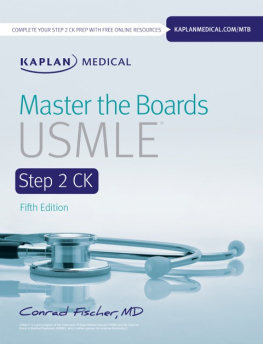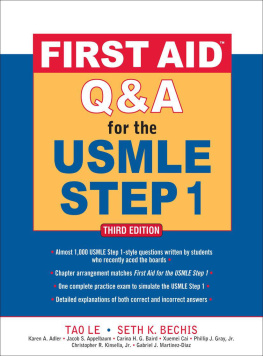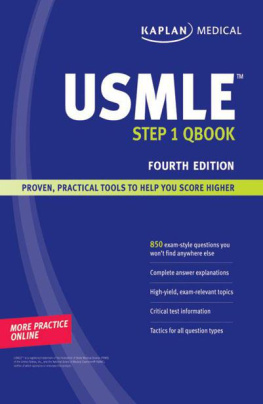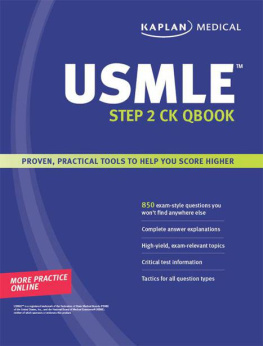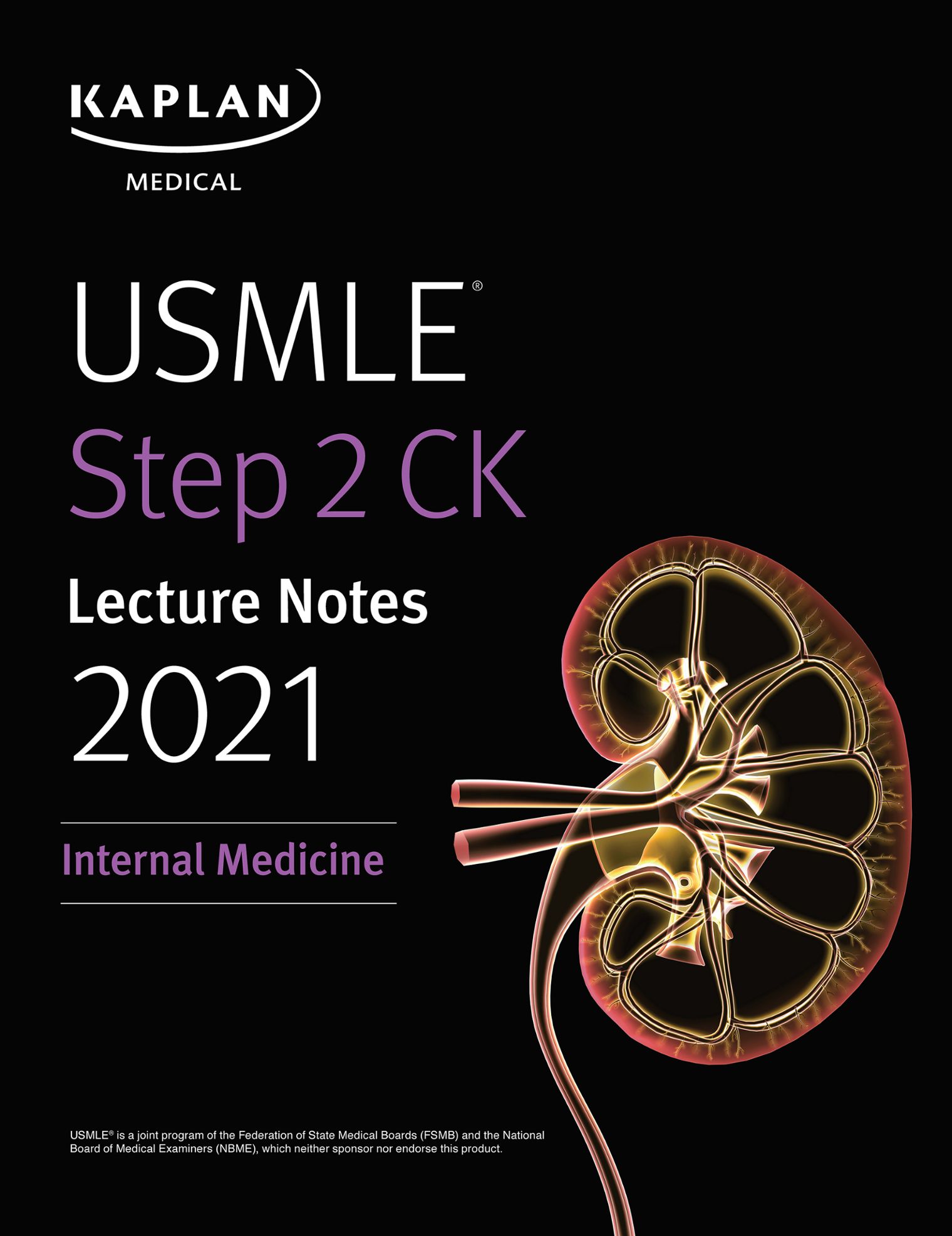
USMLE is a joint program of the Federation of State Medical Boards (FSMB) and the National Board of Medical Examiners (NBME), which neither sponsor nor endorse this product.
This publication is designed to provide accurate information in regard to the subject matter covered as of its publication date, with the understanding that knowledge and best practice constantly evolve. The publisher is not engaged in rendering medical, legal, accounting, or other professional service. If medical or legal advice or other expert assistance is required, the services of a competent professional should be sought. This publication is not intended for use in clinical practice or the delivery of medical care. To the fullest extent of the law, neither the publisher nor the editors assume any liability for any injury and/or damage to persons or property arising out of or related to any use of the material contained in this book.
2020 by Kaplan, Inc.
Published by Kaplan Medical, a division of Kaplan, Inc.
750 Third Avenue
New York, NY 10017
All rights reserved under International and Pan-American Copyright Conventions. By payment of the required fees, you have been granted the non-exclusive, non-transferable right to access and read the text of this eBook on screen. No part of this text may be reproduced, transmitted, downloaded, decompiled, reverse engineered, or stored in or introduced into any information storage and retrieval system, in any form or by any means, whether electronic or mechanical, now known or hereinafter invented, without the express written permission of the publisher.
ISBN: 978-1-5062-6140-9
Kaplan Publishing print books are available at special quantity discounts to use for sales promotions, employee premiums, or educational purposes. For more information or to purchase books, please call the Simon & Schuster special sales department at 866-506-1949.
Editors
- Joseph J. Lieber, MD
- Director of Medicine
- Elmhurst Hospital Center
- Associate Professor of Medicine
- Associate Program Director of Medicine for Elmhurst Site
- Icahn School of Medicine at Mt. Sinai
- New York, NY
- Frank P. Noto, MD
- Assistant Professor of Internal Medicine, Department of Hospital Medicine
Associate Program Director of Education for Elmhurst Site Icahn School of Medicine at Mt. Sinai
- Internal Medicine Clerkship and Sub-Internship Site Director
Icahn School of Medicine at Mt. Sinai - New York, NY
Contributors
- Raj Dasgupta, MD, FACP, FCCP, FAASM
- Assistant Professor of Clinical Medicine
- Assistant Program Director of Internal Medicine Residency
- Associate Program Director of Sleep Medicine Fellowship
- Department of Medicine, Division of Pulmonary, Critical Care and Sleep Medicine
- Keck School of Medicine of USC University of Southern California
- Los Angeles, CA
The editors would also like to acknowledge Manuel A. Castro, MD, AAHIVS; Amirtharaj Dhanaraja, MD; Aditya Patel, MD; Irfan Sheikh, MD; and Frazier Stevenson, MD for their contributions.
We want to hear what you think. What do you like or not like about the Notes?
Please email us at medfeedback@kaplan.com.
Preventive Medicine
Learning Objectives
- Describe appropriate screening methods as they apply to neoplasms of the colon, breast, cervix, and lung
- Describe epidemiological data related to incidence and prevention of common infectious disease, chronic illness, trauma, smoking, and travel risks
ScreeningS
For all diseases that have recommended screening:
- Effective intervention must exist
- After a positive test result, course of events must be acceptable to patient
- Screening test must be valid, i.e., it must have proven in trials to decrease overall mortality
For a screening test to be recommended for regular use, it has to be extensively studied to ensure that all of the above requirements are met.
Cancer Screening
A 39-year-old woman comes to the clinic very concerned about her risk of developing cancer. Her father was diagnosed with colon cancer at age 43, and her mother was diagnosed with breast cancer at age 52. She is sexually active with multiple partners and has not seen a physician since a car accident 15 years ago. She denies any symptoms at this time, and her physical examination is normal. She asks what is recommended for a woman her age.
Screening tests are done on seemingly healthy people to identify those at increased risk of disease.
However, even if a diagnostic test is available, that does not always mean it should be used to screen for a particular disease. That is because diagnostic tests may:
- Have adverse (and possibly iatrogenic) effects (e.g., large bowel perforation secondary to a colonoscopy)
- Be expensive, unpleasant, and/or inconvenient
- Lead to ineffective or even harmful treatment
The 4 malignancies for which regular screening is recommended are cancers of the colon, breast, cervix, and lung.
Colon Cancer
If there is no significant family history of colon cancer, screen everyone starting age 50.
- Colonoscopy every 10 years (preferred)
- Annual fecal occult blood test and sigmoidoscopy with barium enema every 5 years
If there is a single first-degree relative diagnosed with colorectal cancer age <60 or multiple first-degree relatives with colon cancer at any age, screen with colonoscopy starting age 40 or 10 years before the age at which the youngest affected relative was diagnosed, whichever age occurs earlier.
- Repeat colonoscopy every 5 years
- Routine screening can stop age >75, as per the U.S. Preventive Services Task Force (USPSTF)
Breast Cancer
Note
Tamoxifen prevents cancer by 50% in those with >1 family member with breast cancer.
Mammography plus manual breast exam are used to screen for breast cancer. (Self-breast exam by itself is not recommended as a screening tool.)
- Mammography with or without clinical breast exam every 12 years from age 5074
- If there is a very strong family history of breast cancer (i.e., multiple first-degree relatives), consider prophylactic tamoxifen, which prevents breast cancer in high-risk individuals
Cervical Cancer
Note
Prostate Screening
USPSTF concludes that the current evidence is insufficient to assess the balance of benefits/risks of prostate cancer screening in men age <75. It recommends against screening in men age >75.
For USMLE, do not screen for prostate cancer.
Note
A pack year is smoking an average of 1 pack of cigarettes per day for 1 year. A patient with a smoking history of 30 pack years is considered a heavy smoker.
The screening test of choice for the early detection of cervical cancer is the Papanicolaou smear (the Pap test). In average risk women, screen as follows:
- Starting age 21, screen with Pap (regardless of onset of sexual activity) every 3 years until age 65
- Alternatively, screen with Pap + HPV testing every 5 years, age 3065
Next page

